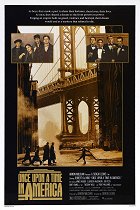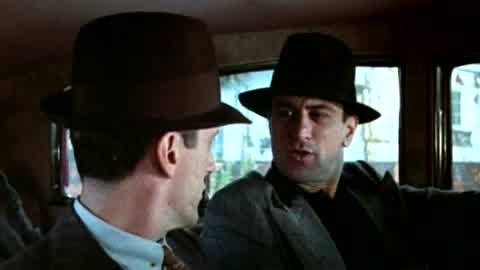Directed by:
Sergio LeoneCinematography:
Tonino Delli ColliComposer:
Ennio MorriconeCast:
Robert De Niro, James Woods, Elizabeth McGovern, Joe Pesci, Burt Young, Tuesday Weld, Treat Williams, Danny Aiello, Richard Bright, James Hayden (more)VOD (3)
Plots(1)
Epic, episodic, tale of the lives of a small group of New York City Jewish gangsters spanning over 40 years. Told mostly in flashbacks and flash-forwards, the movie centers on small-time hood David 'Noodles' Aaronson and his lifelong partners in crime; Max, Cockeye and Patsy and their friends from growing up in the rough Jewish neighborhood of New York's Lower East Side in the 1920s, to the last years of Prohibition in the early 1930s, and then to the late 1960s where an elderly Noodles returns to New York after many years in hiding to look into the past. (official distributor synopsis)
(more)Videos (1)
Reviews (12)
A drawn-out macho mafia saga that gets old as the characters become sparser and the dialogue becomes shallower. There are flashes of Leone's brilliance, of course, but the film is generally similar to Morricone's music. It's quite impressive, but too familiar; the Pan almost kills even the phenomenal Picnic at Hanging Rock. It turns this festival of plaintive glances by human exclamation marks into a nostalgic museum exhibit of a film world that fortunately belongs to yesterday.
()
There are some pictures for which even the maximum number of stars is too constricting. And Leone’s most personal work is just that type of movie. But it is hard to give it an adequate rating since even the four-hour version eventually released years later is still too short to be able to reveal all of the storylines that Sergio Leone had filmed. The result is that we are left with a lot of begun, but unfinished storylines (Frankie Joe, Pesci and Fat Moe, to name just a few). They should release the originally intended six-hour version. This way we are left with incredibly strong historical frescos that Leone guides extremely sensitively through three time periods, supported by Morricone’s music, superb actors, amazing technical effects and outstanding production design. The best part of this picture is the first third. This is where Leone’s storytelling is at its best and I dare say that this part is the very best thing that Leone created (the word “filmed" simply isn’t enough in this case) during his long career.
()
[251 minute extended] Leaving aside the scale of the work and the incredible set and camera work, there remains a bit of a taste on the palate that Leone has sold out his previous revisionist approach to film genres here for a purely academic perspective, which is most evident in his work with the characters, which isn't very well developed due to the fact that they aren't given as much space as the sets. With de Niro's endless silent and melancholic glances at the recollection of his mafia youth, after a while I just saw... well, de Niro staring. And apart from that the story, namely building a giant sophisticated mafia saga on a restrained, yet actually stupid gangster, seems good to me. The heretic in me can almost imagine a good 140-minute cut of that film, except there would be cutting not of scenes but within scenes.
()
I could bend over backward, and I still probably wouldn't find any mistakes in Once Upon a Time in America. For almost four hours, Sergio Leone tells us what it means to have a friendship beyond the grave. With an almost unhealthy precision, it closely observes the three-generational clash of men who had no other choice but to do what they did since their youth. Building an empire with all its pleasures and problems. Love, hate, virtue, mistakes, and that friendship... All this in a mesmerizing audiovisual setting. Hypnotic music by Ennio Morricone with a beautifully catchy melody. Long and slow camera "walks." A brilliant shot focuses on a street where a group of boys is crossing, with the iconic Brooklyn Bridge towering in the background, nestled between two buildings. Perfection. Which time period is the best? That's a tough question. Youth, with all its worries, abounds with that childlike look of boys whom the street has forced to grow up all too soon. The central and longest part depicts their built empire during its peak prosperity until the final stage, where the inevitable reckoning of their past actions takes center stage. Leone transitions between these periods subtly and unobtrusively, but always the contrast of period diversity is incredibly beautiful. I have a warm feeling in my heart that I sacrificed four hours for something so spectacular and hard to describe. Master, from the bottom of my heart, thank you...
()
Sergio Leone breathtaking again. I don't know if it’s true that the script took 12 years to develop, but looking at the final quality and refinement of this film, I could easily believe it. The 220 minutes run like a well-oiled machine, the actors perform like clockwork, and Ennio Morricone contributes another unforgettable soundtrack. All this accompanied by a monumental story that manages to grip the viewer so tightly that there is no chance of release before the closing credits. Leone weaves the three storylines very nicely, giving the viewer space to become as attached to the characters as possible and to take in the atmosphere of the prohibition era in which much of the action takes place. But it’s only at the very end that we realize how beautifully all of that has worked all along, and what a wonderfully compelling and thoughtful work we have just had the privilege of seeing. And that’s where I see the greatest magic of Once Upon a Time in America.
()



Ads